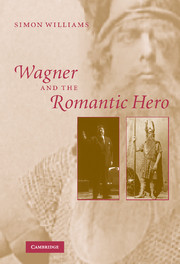Book contents
- Frontmatter
- Contents
- Acknowledgments
- Note on abbreviations of sources
- Introduction
- 1 Modes of heroism in the early nineteenth century
- 2 Wagner and the early nineteenth-century theatre
- 3 Early music-drama: the isolated hero
- 4 Heroism, tragedy, and the Ring
- 5 The last music-dramas: toward the messiah
- 6 Wagner's heroism on stage
- Notes
- Bibliography
- Index
4 - Heroism, tragedy, and the Ring
Published online by Cambridge University Press: 22 September 2009
- Frontmatter
- Contents
- Acknowledgments
- Note on abbreviations of sources
- Introduction
- 1 Modes of heroism in the early nineteenth century
- 2 Wagner and the early nineteenth-century theatre
- 3 Early music-drama: the isolated hero
- 4 Heroism, tragedy, and the Ring
- 5 The last music-dramas: toward the messiah
- 6 Wagner's heroism on stage
- Notes
- Bibliography
- Index
Summary
THE RING AND TRAGEDY
There was no doubt in Wagner's mind that the Ring was a tragedy. While he was writing the poem, he described it as “a tragedy of the most shattering effectiveness.” There is abundant evidence that he thought of the Festival of Dionysus as a model, and both the Oedipus myth and the Oresteia have been mined for parallels. More generally, his correspondence and Cosima's diaries are packed with references to the Greek tragedians, Shakespeare, Calderón, Schiller, and other tragic writers, in contexts indicating that he considered himself to be among their company. Modern critics have been less certain. George Steiner, in his search for symptoms of the “death of tragedy,” fastens on Götterdämmerung as one of those dramas in which the uncompromising forces that destroy human freedom are palliated by “the apotheosis of redemption,” while Lloyd-Jones, influenced by Steiner, argues that “in the Ring in general we find something profoundly alien to the spirit of an ancient tragedy,” citing Wagner's belief in the essential goodness of humanity as the source of this. Whether belief in human goodness and the powers of redemption preclude tragedy is a matter for debate – after all, the Oresteia, that touchstone of Greek tragedy, finishes with a more explicitly redemptive end than the Ring – but the precise nature of the tragedy of the Ring does remain in doubt. This is because in it different modes of tragedy that imply differing and potentially incompatible views of the human condition are fused.
- Type
- Chapter
- Information
- Wagner and the Romantic Hero , pp. 68 - 101Publisher: Cambridge University PressPrint publication year: 2004



